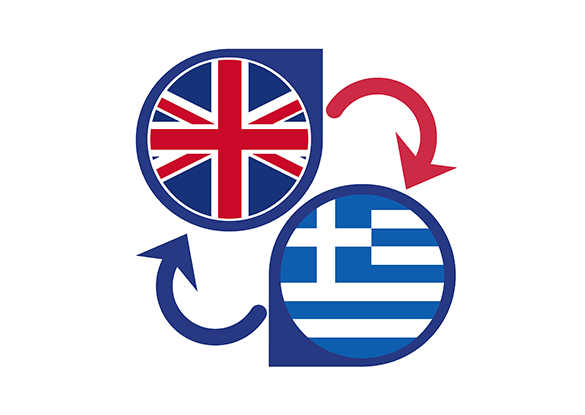Rosetta Translation provides a full range of Greek translation services to companies in London and worldwide. All our Greek translators are fully qualified professionals and all our Greek translations are of the same consistently excellent quality.

We provide certified translations that are recognised by all authorities around the world. Please let us know of your precise requirements when you contact us, or ask to discuss your situation with one of our experienced account managers, who will be more than happy to guide you.
Our translations can be certified, notarised and legalised (also known as “Apostille of The Hague”). We can provide bilingual certificates, certificates in foreign languages, sworn translations by translators accredited with particular courts and local notarisations around the world.
Rosetta Translation is a multi-sector Greek translation specialist. Some of the fields that we have particular expertise in include:
Legal translation
The translation of law-related documents, including of course the translation of contracts and agreeements.
Financial translation
Translating financial documents, including regulatory filings, bank statements, etc.
Technical translation
The translation of technical documentation, such as product manuals, technical specifications, reports, etc.
Medical translation
The translation of medical research reports, pharmaceutical translations such as pharmaceutical trial reports, etc.
We assign every translation to the most appropriate specialised team of highly qualified Greek translators, proofreaders and editors, thus guaranteeing a consistent and excellent quality of Greek translation in each of these various fields.
Combined with our use of translation technology and our extraordinary flexibility as regards client needs, this results in the professional and reliable Greek translation service that our regular customers value.
We also provide Greek interpreting services in London and worldwide.
For a free instant quote, please contact us at any of our local offices in London, Shanghai, New York, Paris or Luxembourg.

Rosetta is unusual amongst translation companies in that it has achieved both the prestigious ISO 9001:2015 certification and the DIN EN 15038 norm, the only norm specifically designed for translation agencies. Our customers can therefore rest completely assured of the consistently high quality of our Greek translations.
Greek Translations can be certified, notarised and legalised to meet your exact requirements.
For English-Greek translations, we only use experienced, native Greek translators, all of whom specialise in a number of different areas of translation to give the best possible results for our customers. Documents are proofread and formatted to suit each client’s individual needs, giving an excellent product.
Greek (Ελληνικά) is one of Europe’s most important languages. It is a major player in European business markets and in the European Union. Greek has around 12 million native speakers, with a further 4-5 million people speaking Greek as a second language.


Whether your Greek-English translation assignment is complex and jargon-heavy or more basic in style, Rosetta Translation always has experienced translators on hand to deliver, with expertise in a number of areas, from technical transport industry jargon to linguistics.
As an internationally aware company, we operate as worldwide a service for our English translation as we do for our other languages. This means that we can provide English in any of the many existing dialects, whether you need British English, American English, Australian English, even Jamaican English, we have the know-how and the expertise.
It goes without saying that all our Greek to English translations are carried out by native English speakers with relevant qualifications in Greek translation.
There is quite a lot of controversy surrounding the translation (or lack of) of foreign names into Greek. There are three general ways being used when it comes to translating those names and that is a) simplification (απλοποίηση) for example with a name like Nicholas Sarkozy, the ι (yiota) would be used at the end, so it would be Σαρκοζί, b) reversibility (αντιστρεψιμότητα) which means that when the name gets translated back it should resemble the original spelling as much as possible, so in this instance, υ (ypsilon) would be used, and Sarkozy would be spelt Σαρκοζύ and lastly c) non-translation which encourages foreign names to stay in their original form, in Latin characters, rather than being transliterated directly into Greek.
As a rule of thumb, at both extremes of formality, the names tend to be left in Latin characters: a) in academic writing (probably mostly out of a concern for precision), and b) in sms, chat forums, internet exchanges (more likely because it comes across as modern and advanced). For ‘normal’ formal levels of writing in between, the more famous a person is, the more likely that their name will be transliterated when translating into Greek. Thus Google hits for “ο τράμπ” outnumber those for “ο trump” by at least a factor of 10; but hits for “ο Μπούτιτζατζ” vs “ο Buttigieg” are close to equal (although at a much lower absolute level than for Trump.)
These rules do not only apply to people’s names but also geographical locations.Thus there is a lot of debate for example on whether Scotland should always be translated as Σκωτία with an ω (omega) or simply as Σκοτία with an ο (omicron). However, just to make things more awkward, there are certain geographical locations that have a fixed spelling and there is no alternative spelling for them. Rome for example that is always spelt Ρώμη with an ω (omega).
There are numerous ways of translating names from English to Greek but just like with anything else that involves the art of translation it is essential that whichever practice is being chosen, there is consistency in order not to confuse the reader in Greek.
The other way around, i.e. in Greek-English translation, the situation is actually much clearer, not least since ELOT (the Greek Organisation for Standardisation) established ELOT 743, a code in accordance with ISO 843, which ensure that Greek names are consistently spelt in Latin letters. It is used by all official Greek authorities, and the Greek Government has conveniently made a handy ELOT 743 tool available online.
This doesn’t mean that there cannot be problem in practice. One common issue is legacy spellings, i.e. long established non-standard spellings of names, often for family names of Greeks that have lived outside of Greece for decades, or even generations. Just flag this issue when you commission a Greek-English translation from us, as we can probably help resolve the situation.






What is the UN French Language Day? On 20 March, we once again celebrate UN French Language Day, a global celebration of linguistic diversity and cultural exchange. Created by the United Nations in 2010, this day is to remind us …

